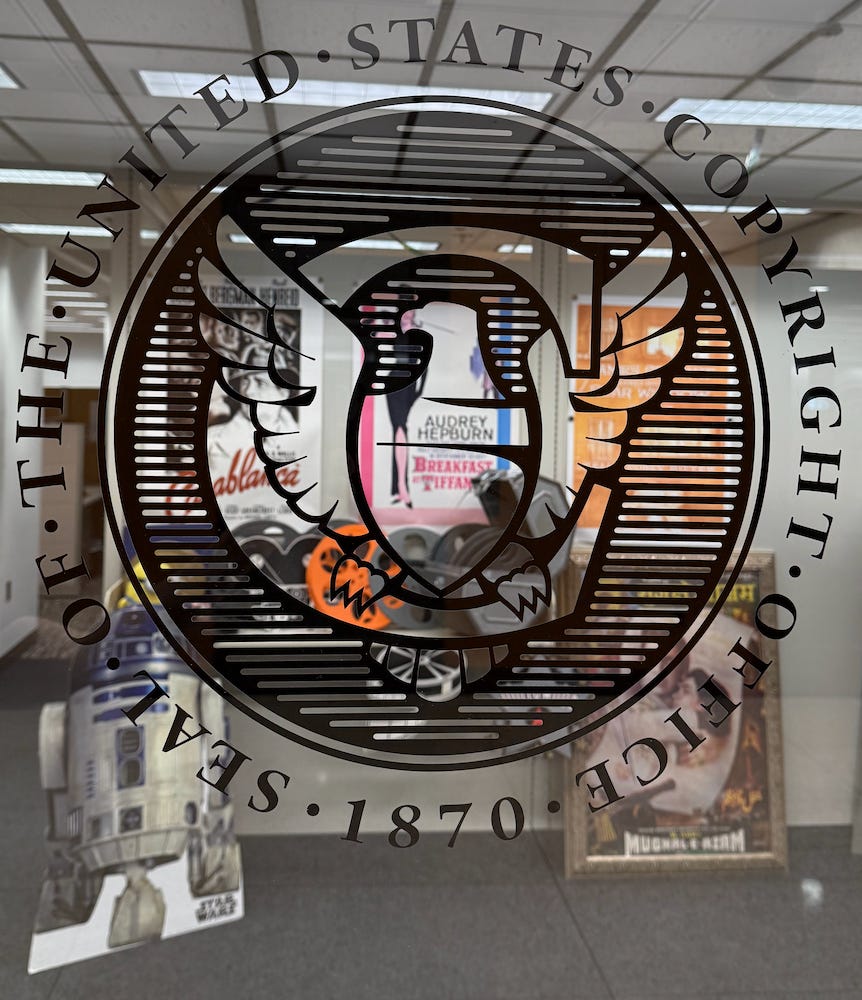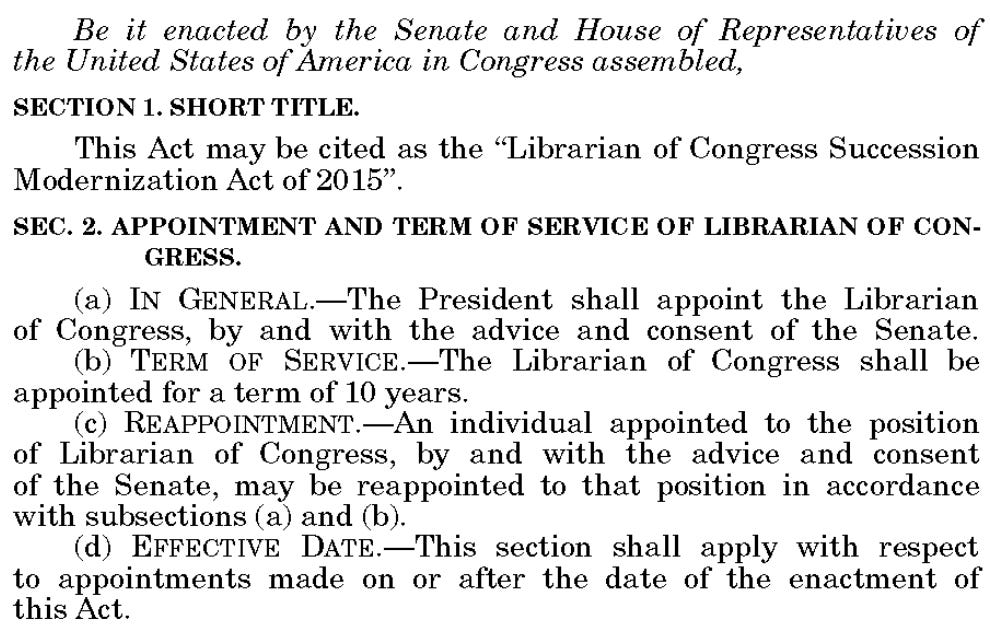Monday's lesson: Don't mess with librarians.
Ultimately, though, Trump's effort to take over the Library of Congress could come down to whether Congress says, "Don't mess with Congress."
What is happening at the Library of Congress?
In recent days, Dr. Carla Hayden, who had been the Librarian of Congress — the head of the Library of Congress (LOC) — was unceremoniously fired by the Trump administration.
First things first, this was completely unjustified based on her performance — and a ridiculous move because her term was up next year anyway. But, let’s move on.
Despite its name, the Librarian of Congress is — by statute — nominated by the president and confirmed by the Senate. This law was last updated in 2015 — but only to add that 10-year term for the Librarian of Congress:
Hayden’s firing was followed soon thereafter by the reported and purported firing of Shira Perlmutter, the Register of Copyright — the head of the U.S. Copyright Office. Notably, that role is not appointed by the president. Instead, the Register of Copyrights is, by statute, appointed by the Librarian of Congress:
By Monday morning, news spread that President Donald Trump had tapped Todd Blanche — Trump’s former criminal defense lawyer who he then appointed to be deputy attorney general — to serve as the Acting Librarian.
But, then Trump team hit a snag: The Library of Congress didn’t go along with it.
Following the firing of Hayden, Robert Newlen — who first worked for the Library of Congress 50 years ago — became the Acting Librarian of Congress. Despite the White House’s effort to install Blanche, this is the message — seen by Law Dork — that Newlen sent a little before noon on Monday:
Newlen essentially said: “The White House said so, but, as I see it, I am still the Acting Librarian of Congress.”
This was important because, not only did Trump seek to install Blanche, but — as Wired, CBS News, The New York Times, and Rolling Stone have reported — also “Paul Perkins, an associate deputy attorney general who the letter said would serve as the acting register of copyrights and the director of the Copyright Office, and Brian Nieves, a deputy chief of staff and senior policy counsel who had been designated as the acting deputy librarian.“
They showed up first thing Monday morning, seeking access to the copyright office, per the Times, but they were not allowed access. Thus, Newlen’s subsequent email to staff. One source within the LOC added that staff were told that LOC is waiting on Congress as to next steps.
Was any of this legal?
Although the interplay of the Appointments Clause, vacancies laws, and various court cases interpreting that clause and those laws gets complicated real quick, Stanford Law professor Anne Joseph O’Connell, one of the leading vacancies experts, essentially says that the firing of Hayden is the most likely permissible action by Trump here (and even that has a counterargument). The steps beyond firing Hayden, though, become more and more legally questionable. For our purposes, that’s a sufficient summary, but do go read her thread.
By mid-afternoon Monday, some Democrats and at least one key Republican, Senate Majority Leader John Thune, had pushed back to varying degrees.
Politico reported that “Thune said in a brief interview that congressional leaders ‘want to make sure we’re following precedent and procedure’ in naming a replacement for Carla Hayden,” later adding that he also said that “we want to make sure congressional equities are respected and protected in this process.”
A handful of House Democrats, meanwhile, led by Rep. Joe Morelle, the ranking Democrat on the Committee on House Administration, urged the Library of Congress’s inspector general to open and prioritize an investigation into "the possible unauthorized transfer of congressional or Library data to executive branch agencies and personnel."
They specifically raised concerns about another entity that operates within LOC — the Congressional Research Service — asking the inspector general to investigate “whether the Department of Government Efficiency (DOGE) or other executive branch entities have requested or otherwise attempted to access or review Library data, including but not limited to communications between the Congressional Research Service and congressional offices.“
Why is this happening?
The Library of Congress was not initially the target of Trump’s wrath, unlike some other agencies. Until a Daily Mail story from April 30 appeared, that is. Citing opposition to Hayden, as well as Perlmutter, from the American Accountability Foundation (AAF), the tide seemed to turn. Per the story, Tom Jones, the president of AAF told the Daily Mail:
“The President and his team have done an admirable and long-needed job cleaning out deep state liberals from the federal government. It is time they show Carla Hayden and Shira Perlmutter the door and return an America First agenda to the nation's intellectual property regulation.”
AAF is a dark money group that had been targeting federal employees under the guise of “watch lists” both before Trump won re-election in 2024 and in the six months since his electoral win.
As I noted Sunday, Perlmutter’s firing has also been linked by many — including by CBS News, which first reported it — to a report the Copyright Office issued last week that was critical of aspects of artificial intelligence relating to the fair use doctrine.
As of Monday afternoon, however, signage reflected no change to the head of the copyright office on the wall outside the Public Information Office of the U.S. Copyright Office.
Then again, the website for the Library of Congress still lists Hayden as running the operation.
This is a weird situation, right?
Yes! But, the Library of Congress is an odd entity in government.
While the president nominates the Librarian of Congress, with the advice and consent of the Senate, federal law also sets forth the “Joint Committee on the Library.” If you think that refers to some joint committee between the executive and legislative branches, you’d be wrong. Instead, the statute makes clear:
What’s more, this committee goes back to 1800, a part of the same bill that moved the federal government from Philadelphia to Washington, D.C. As the literal book on “The Library” noted, “It is Congress's oldest continuing joint committee.“ Rep. Bryan Steil of Wisconsin is the chair of the committee in the current Congress, and Sen. Mitch McConnell of Kentucky is the vice chair.
Notably, the Library of the Congress is the rare entity to have a statutory role for all three branches. The law library established as part of the Library of Congress includes multiple provisions addressing the judicial branch and Supreme Court justices.
But, to return to the question of the day, the U.S. Court of Appeals for the D.C. Circuit held back in 2012 that, for purposes of the Appointments Clause, “the Library of Congress is a freestanding entity that clearly meets the definition of ‘Department,’” meaning that it is a component of the executive branch — in at least some ways.
As Judge Stephen Williams wrote of the Library of Congress:
That’s not the end of it, though. Williams’s characterization that “some” of the Library of Congress’s "functions” are “primarily” legislative seems to me to understate things a bit. The chapter of the U.S. Code addressing the Library of Congress makes clear repeatedly that it is a component of the legislative branch in many ways, both at its founding and as now established.
Most importantly, there is the Congressional Research Service. Under the relevant statute, the Librarian of Congress is to appoint the head of CRS “[a]fter consultation with the Joint Committee on the Library” — so, members of Congress — and not with the president or anyone in the executive branch.
Additionally, the chapter references the key role that the “Architect of the Capitol” — selected solely by members of Congress under a 2023 change in the law — plays in caring for the grounds and structures of the Library of Congress. And, as may have been relevant on Monday, the U.S. Capitol Police play a statutory role in the Library of Congress’s operations as well. Notably, the former Library of Congress Police was merged into the Capitol Police, by law, back in 2007.
There are many facts still unclear and much that remains legally undecided here — but what is clear is that Congress has grounds to stand up for itself and assert its role in running the Library of Congress.











Solid research; very informative article. Please write more as this controversy unfolds. (I am especially interested in the copyright - artificial intelligence issue.)
Again, an excellent post, Chris. You've done a terrific job of clearly explaining all the dynamics in play over this latest trump fiasco. Thank you.